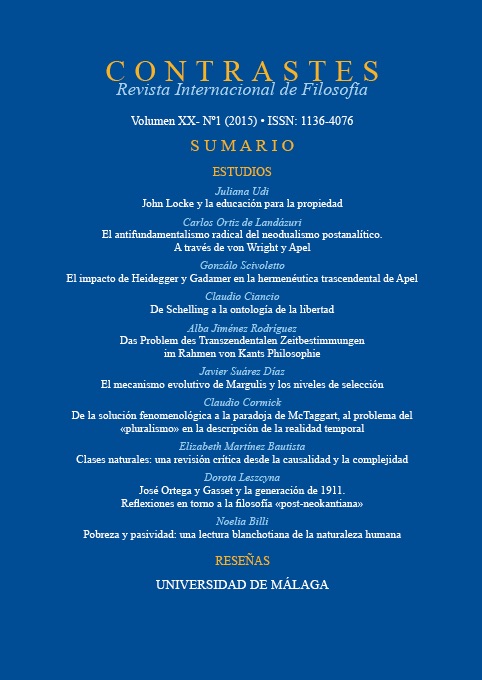From Schelling to the Ontology of Freedom
DOI:
https://doi.org/10.24310/Contrastescontrastes.v20i1.2301Keywords:
God, Freedom, Ontology, Reason, EcstasyAbstract
The philosophy of the last Schelling presents decisive insights for an ontology of freedom. Particularly two themes of the last Schelling lead to the ontology of freedom proposed by Luigi Pareyson: the ecstasy of reason of which Pareyson himself gave a profound interpretation and the structure of God’s freedom on the configuration of which I insisted too. Ecstasy is the interruption of the development of reason, which comes to its limits and is founded by the being, which is beyond reason’s power. From here, Schelling tries to process a complex and not always linear conception of God’s freedom both as freedom of creation and, more originally, as freedom of his own being. In this attempt Schelling does not depart completely from the metaphysical tradition of the principle of necessity. The ontology of freedom thinks freedom not only as a beginning, but as a choice between being and not being. In this way, on the one hand the absolute origin escapes radically from the necessity and on the other hand, just because its being is chosen within an alternative, its position of the being is not a simple self-position, which would succumb to the necessity, but the position of something different from itself: the being with regard to which it can exercise its free power.Downloads
Metrics
Publication Facts
Reviewer profiles N/A
Author statements
Indexed in
-
—
- Academic society
- N/A
- Publisher
- Universidad de Málaga
Downloads
Published
How to Cite
Issue
Section
License
This journal provides immediate free access to its content under the principle of making research freely available to the public. All content published in Contrastes. Revista Internacional de Filosofía, are subject to the Creative Commons Attribution-NonCommercial-ShareAlike 4.0 license whose full text can be found at <http://creativecommons.org/licenses/by-nc-sa/4.0>
It is the responsibility of the authors to obtain the necessary permissions of the images that are subject to copyright.
Authors whose contributions are accepted for publication in this journal will retain the non-exclusive right to use their contributions for academic, research and educational purposes, including self-archiving or repository in open access repositories of any kind.
The electronic edition of this magazine is edited by the Editorial Service of the University of Malaga (Uma Editorial), being necessary to cite the origin in any partial or total reproduction.










5.png)
